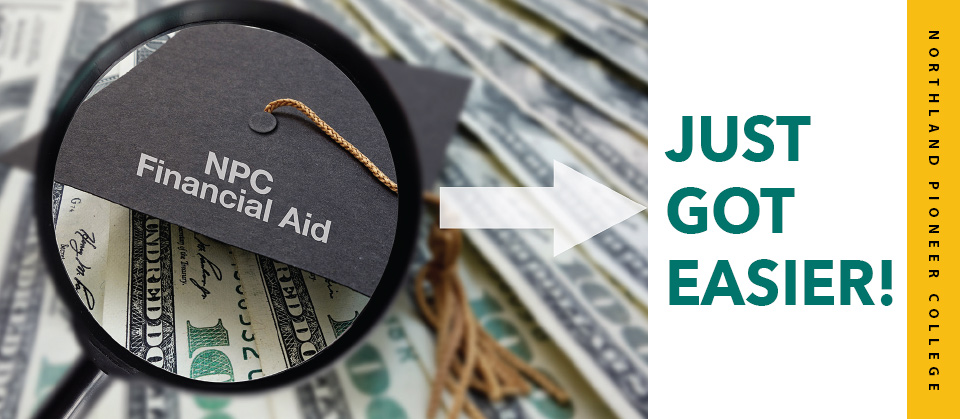 by Everett Robinson
by Everett Robinson
Students and their parents applying for financial aid and scholarships should experience less stress after two major national process changes were implemented October 1.
First, students are able to file a Free Application for Federal Student Aid (FAFSA) for the next school year three months earlier. This is the form that every U.S. college student has to submit in order to be eligible for any need-based financial aid. Previously, the FAFSA would not become available until January 1, but now the form is available October 1.
With the FAFSA previously not available until January and the priority deadline for completing all paperwork April 15, time was a critical factor, noted Northland Pioneer College’s Financial Aid Director Beaulah Bob-Pennypacker. Making the FAFSA available in October means students will learn if they are eligible for aid sooner if they take advantage of the early submission date.
Second, tax information from the previous year’s return is now used on the FAFSA. For example, if a student plans to attend college during the 2017-18 academic year, the 2015 tax return information would be used on that year’s FAFSA instead of having to wait until you filed your 2016 taxes. This new policy is known as “prior-prior year.”
And much of that data is now imported electronically from the Internal Revenue Service (IRS) using FAFSA’s Data Retrieval Tool, reducing the need to estimate incomes that may later need correcting, or waiting for the current year’s tax filing. The U.S. Department of Education estimates auto data entry will cut the online filing time to an average of under 20 minutes!
Many students and parents mistakenly thought they had to wait to file the FAFSA until after they filed their current year’s taxes, explains Bob-Pennypacker. The “prior-prior-year” tax data makes for a more accurate FAFSA, eliminates the need to make corrections from estimated income levels and the subsequent delays for required federal verification.
So, why should you complete a FAFSA?
FAFSA information is not only used to determine eligibility for federal student aid programs, such as a Pell Grant and work-study opportunities, but also many institutional and private scholarships. Many students could qualify for the Pell Grant, which is money that does not have to be repaid, but do not apply because they believe their income levels are too high. The education advising website Edvisors.com estimates more than 2 million students didn’t apply for a Pell Grant in the 2011-12 academic year — but 1.3 million of those would have qualified! An analysis by Forbes Magazine deter-mined students/parents with annual incomes in excess of $77,000 could qualify for a Pell Grant, depending on family size and number of students in college.
According to the American Association of Community Colleges (AACC), the federal Pell Grant program remains by far the most important student aid program for community college students. Pell Grants assist more than 7 million college students each year, and approximately one-third of these students attend community colleges.
At NPC, 811 students received Pell Grants totaling more than $2.5 million in the 2015-16 academic year. “I never thought I would qualify but I applied anyway and got it. I am so glad I made the effort,” says Kari Henry, a psychology student from Taylor.
Priority Deadlines
At NPC, and many other colleges and universities, completed financial aid paperwork should be completed by priority deadlines. “At NPC, those dates are April 15 for the fall semester, October 15 for spring and March 15 for summer,” stresses Bob-Pennypacker. While applications are accepted after those dates, the financial aid awards may be delayed until after the start of the semester. In those cases, students may opt to use the eCashier payment plan to help them budget their tuition, fees and book costs over one semester.
Have questions or not sure how to begin?
Go to www.npc.edu/financial-aid/scholarships and click on the link called, “7 Easy Steps to the FAFSA” to watch a how-to video that will help you get started. If you still have questions or need help, call the NPC Financial Aid Office, (800) 266-7845, ext. 7318. You can also learn more about available scholarships at NPC by visiting www.npc.edu/scholarships.
